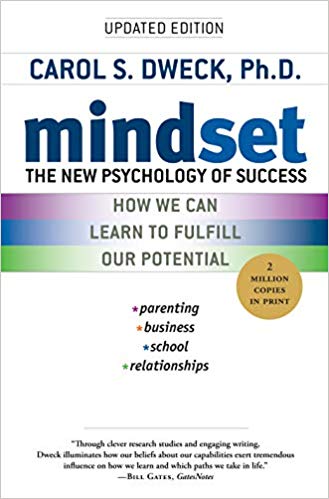

This article is an excerpt from the Shortform summary of "Mindset" by Carol Dweck. Shortform has the world's best summaries of books you should be reading.
Like this article? Sign up for a free trial here .
What are the key growth mindset characteristics? How do they affect success in school, sports, business, and relationships?
We’ll cover the core beliefs and growth mindset characteristics that set successful people apart.
What Is the Growth Mindset?
- Core belief: Everyone can learn and grow.
- What happens:
- You focus on learning and growing.
- You welcome challenges.
- You persist in the face of obstacles.
- You see effort as a key to success.
- You welcome critical feedback.
- You learn from others’ success.
- Result: You continue to reach new levels of achievement.
Growth Mindset Characteristic #1: Defining Success as the Opportunity to Learn
When you start out in life, success is about learning. You’re born with a drive to learn. Babies learn and stretch themselves every day. They don’t worry about failing or quit. For instance, they don’t decide walking is too hard and give up or fear falling. They just keep trying. This is the first growth mindset characteristic.
As early as preschool age, however, children develop mindsets or beliefs about their ability. Fixed mindsets slow or shut down the intense drive to learn. Some children become fearful of not being seen as smart; they begin rejecting challenges. Others, with this growth mindset characteristic, embrace challenges and relish becoming smarter. Fixed mindset children become non-learners.
For instance, the author and her research team offered four-year-olds a choice of redoing an easy puzzle or trying a new, harder one. Children who believed in fixed traits wanted to redo the easy puzzle (the safe choice), while children with growth mindset characteristics wondered why anyone would want to keep redoing the same thing when they could try something else. In other words, children with a fixed mindset wanted to make sure they succeeded, as they believed smart people always do, while those with growth mindset characteristics wanted to get smarter.
Growth Mindset Characteristics of CEOs
Chrysler CEO Lee Iacocca was successful at first in introducing new initiatives in the struggling company. But after his initial success, he lapsed into a fixed mindset of seeking validation rather than improvement. He kept bringing back the same models of cars each year, although consumers were rejecting them for more innovative Japanese models. He got rid of his critics and elevated people who fed his ego, which was a road to failure.
Growth-minded CEOs aren’t afraid to acknowledge a need to learn through questioning and receiving critical feedback — as a result, they grow and their companies do too. For example, when Lou Gerstner was hired to turn IBM around, he ignored Wall Street and focused on the long term, although he was criticized for not immediately boosting stock prices. This exemplifies growth mindset characteristics.
Growth Mindset Characteristics in Sports
Sports offers numerous examples of growth-minded athletes who constantly stretched themselves. In fact, stretching, rather than winning, is what motivated them.
For example, as a child, soccer player Mia Hamm pitted herself against older, more experienced players to improve her skills. At age ten, she joined the eleven-year-old boys’ team. She continued this approach in her college career, joining the top college team in the U.S. She tried to “play up” to the level of better players and as a result, she improved faster than she had thought possible. This is typical of someone with growth mindset characteristics.
Growth Mindset Characteristics in Relationships
Whether you choose validation or improvement can shape your relationships as well as your performance at work.
For instance, when asked to describe their ideal mate, fixed-mindset people wanted someone who would validate them — put them on a pedestal and make them feel perfect. Growth-minded people wanted a mate who could see their flaws and help them improve, and encourage them to try new things.
Growth Mindset Characteristic #2: Seeing the Potential to Grow
One reason people with a fixed mindset feel they have to be perfect is that they see every test or evaluation as a permanent measure of their ability.
For example, in a study of fifth graders, researchers told them that a certain test could measure their ability. Although the researchers provided no other information about the test, the fixed-mindset students concluded that it could not only measure how smart they were, but it could also measure how smart they’d be as adults, essentially defining them forever. Growth-minded students didn’t believe a test could measure how smart they were, nor did they believe it could predict how smart they’d be in the future because their intelligence was always growing.
Fixed-mindset educators do in fact believe you can measure someone’s ability and determine their potential. But those who’ve tried to do that have been wrong repeatedly. Examples of people who were told they lacked potential include Charles Darwin, Marcel Proust, Ray Charles, Elvis Presley, Lucille Ball, and Jackson Pollock.
By definition, you can’t predict potential, if it’s understood as the capacity to develop over time with effort and training. It’s impossible to be certain of how far anyone can go with effort and training. For example, many of artist Paul Cezanne’s early paintings were terrible. He needed time and effort to develop. Believing in your own potential is a key growth mindset characteristic.
———End of Preview———

Like what you just read? Read the rest of the world's best summary of "Mindset" at Shortform . Learn the book's critical concepts in 20 minutes or less .
Here's what you'll find in our full Mindset summary :
- The difference between a growth and a fixed mindset
- How a fixed mindset keeps you back throughout your life: education, relationships, and career
- The 7 key ways to build a growth mindset for yourself





